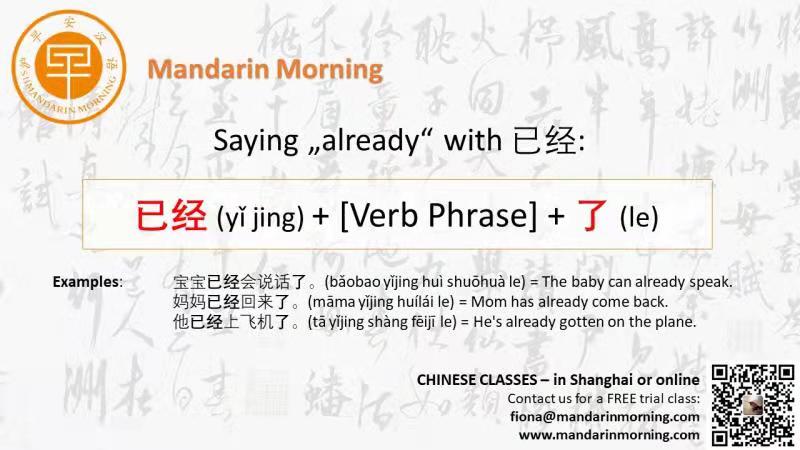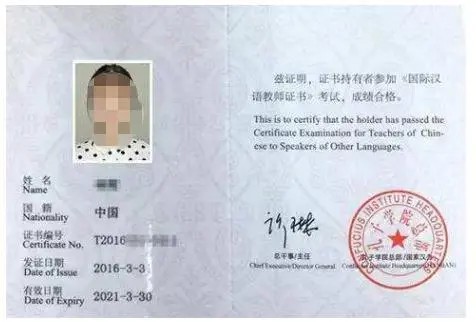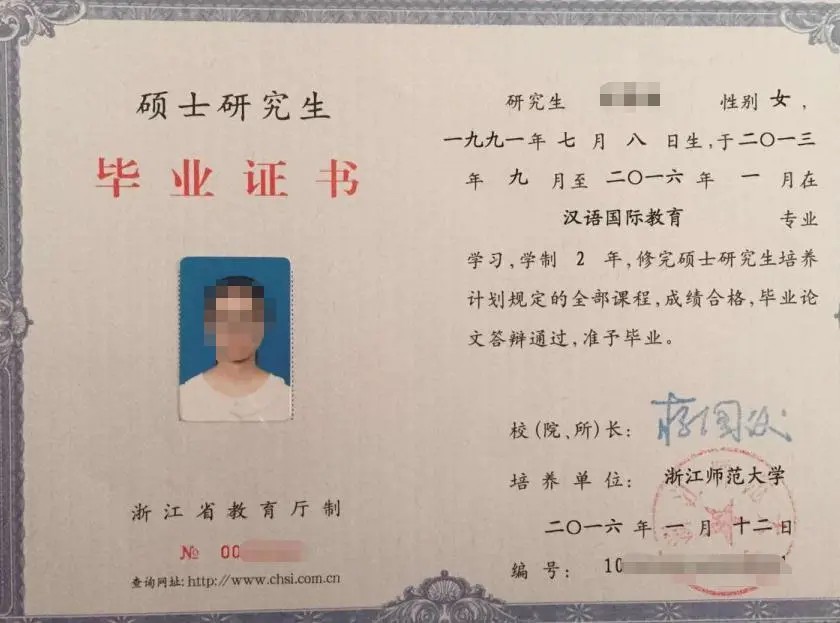已经⋯⋯了 (yǐ jīng ... le) is the basic pattern used to express "already" in Chinese. It's easy to forget the 了 (le) on the end, but using it will make your Chinese more natural. Basic Use: 已经 (yǐjīng) with Verb Phrases: Structure: 已经 + [Verb Phrase] + 了 The most common structure is to use 已经⋯⋯了 (yǐ jīng... le) with a verb phrase. Examples: 他们已经走了。(tāmen yǐjīng zǒu le) = They've already left. 我已经有男朋友了。 (wǒ yǐjīng yǒu nánpéngyou le) = I already have a boyfriend. 宝宝已经会说话了。(bǎobao yǐjīng huì shuōhuà le) = The baby can already speak. 妈妈已经回来了。(māma yǐjīng huílái le) = Mom has already come back. 他已经上飞机了。(tā yǐjīng shàng fēijī le) = He's already gotten on the plane. 已经 (yǐjīng) with Adjectives: Structur: 已经 + (很 +) Adj. + 了 Sometimes an adjective or a time noun is used instead of a typical verb phrase: Examples: 爸爸妈妈已经老了。(bàba māma yǐjīng lǎo le) = Mom and dad are already old. 已经很便宜了。(yǐjīng hěn piányi le) = It is already very cheap. 你女朋友已经很漂亮了!(nǐ nǚpéngyou yǐjīng hěn piàoliang le) = Your girlfriend is already very beautiful! 你的感冒已经好了吗?(nǐ de gǎnmào yǐjīng hǎo le ma) = Is your cold already better? 已经很晚了,我们走吧。(yǐjīng hěn wǎn le, wǒmen zǒu ba) = It's already really late. Let's go. 已经 (yǐjīng) with Time Nouns: A "time noun" simply refers to almost any word in Chinese indicating a time something happened. Structure: 已经 + Time + 了 Examples: 已经 11点了,女儿还没回来。(yǐjīng shíyī diǎn le, nǚ'ér hái méi huílái) = It is already 11 o'clock, and my daughter has not returned. 爷爷已经八十五岁了。(yéye yǐjīng bāshí-wǔ suì le) = Grandpa is already eighty-five years old. 我学习中文已经一 年了。(wǒ xuéxí Zhōngwén yǐjīng yī nián le) = I have already been studying Chinese for a year. 他在洗手间里已经半个小时了。(tā zài xǐshǒujiān lǐ yǐjīng bàn gè xiǎoshí le) = He has already been in the bathroom for half an hour. 爸爸去北京出差已经两天了。(bàba qù Běijīng chūchāi yǐjīng liǎng tiān le) = It has already been two days since dad went to Beijing on business trip. Negative Form Structure: 已经 + 不 + Verb + 了 The negative structure simply adds a 不 (bù) after 已经 (yǐjīng), and before the verb (or possibly adjective). Generally this negative 已经 (yǐjīng) structure is translated into English as "not... anymore" rather than using the word "already." Examples: 我已经不喜欢你了。(wǒ yǐjīng bù xǐhuan nǐ le) = I don't like you anymore. 他已经不爱他的猫了。(tā yǐjīng bù ài tā de māo le) = He doesn't love his cat anymore. 他们已经不住在中国了。(tāmen yǐjīng bù zhù zài Zhōngguó le) = They don't live in China anymore. 我已经不需要父母的钱了。(wǒ yǐjīng bù xūyào fùmǔ de qián le) = I don't need my parents' money anymore. 你已经不在Google工作了吗?(nǐ yǐjīng bù zài Google gōngzuò le ma) = You don't work at Google anymore? #Our teachers # More than 10 years teaching experience Master Degree Certificate for teaching chinese as a foreign language   # About us # Founded in 2007 Chinese test and training center 200+ Chinese teachers 5000+ students  # Contact us# Name:fiona Phone number:021-52287809,13918358891 E-mail:info@mandarinmorning.com www.mandarinmorning.com If you are interested to join Mandarin Morning school or want more details about our services, scan the following QR code. ☟   Mandarin Morning Chinese test center attached to Confucius institute headquarters Authorized Test Center and Training Center for International Chinese Language Teacher Certificater 10 years+ ,200 teachers ,more 10000 students,200+companies  |